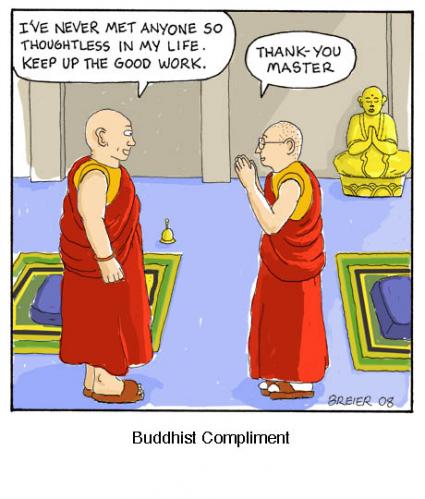Monday, March 7, 2011
Stereotype Blog
Breier. (2008). Buddhist Compliment. [online]
Available: http://www.toonpool.com/user/1688/files/buddhist_compliment_321115.jpg
March 7, 2011
The assignment this week was to find some kind of image, video clip, etc that shows an American stereotype of a Buddhist person. This assignment was very fun because I was able to search around on the internet and see what different kinds of stereotypes people had of this religion and compare them to what really is true. Much of the images and videos were comic parodies and were quite entertaining.
The image I chose is one where two Buddhist monks are facing each other and one is complimenting the other on how “thoughtless” he is. The other monk seems to greatly appreciate this compliment. This image I believe is poking fun at meditation. Americans seem to not understand the concept behind it. Meditation is part of the Buddhist path to Enlightenment. There are many different ways of meditating and different reasons to doing so. But Americans mostly see it as a monk just sitting in the lotus position, as the statue in the background, and doing nothing. Clearing the mind is part of the process, but Buddhists see meditation as something deeper than just clearing the mind. It allows them to set aside all the negative things that are obstructing their lives and come into a peaceful, relaxed state of mind. This allows them to open their minds to enlightenment, hopefully. In a way the cartoon is true, because monks do try to be as “thoughtless” as possible while meditating, how ever the it is not just simply doing nothing as Americans seem to think.
Warner himself points out the stereotype of the monks’ inactivity in his statement about the “usual image of the serene monk sitting in his mountain temple sipping tea and dispensing cosmic wisdom” (pg. 11). He also tells of how people do not see monks as being able to have any jobs other than yoga teachers and the like. This relates to the cartoon because Americans think of Buddhists as just sitting around meditating and being “thoughtless” all day. Warner himself states that he has a hard time seeing Buddhist practitioners that holds “real jobs in the secular world” (pg. 12). He then tells how he himself does not fit the stereotypical, meditating Buddhist with a befitting job.
Subscribe to:
Post Comments (Atom)

Your comments about the stereotype presented in this cartoon are very thoughtful. This is quite a negative stereotype, because it shows the monks as being very traditional, dressed in robes and with shaved heads. Their main purpose in life is shown to be thoughtlessness. This in fact is not true, as Warner points out. There is no iron cast "type" for being a Buddhist, and they can come from all different backgrounds. Also, I agree with you in saying that meditation is opening up your mind to enlightenment, rather than just eliminating your mind of all thoughts. This is probably quite a common misconception in the Western world. I think a lot of people misunderstand the practice and point of meditation.
ReplyDeleteI think that the stereotypes we learn about other cultures are so constantly reinforced by others, that they become almost impossible to change without education. Until people know the truth about meditation they will continue to talk about the stereotypes associated with it. Its known that people mock what they do not understand. People are also scared of what they do not understand and using humor can be a means of belittling what we do not know without exposing our weaknesses. I could not agree more with your comment about Americans having the wrong idea about meditation. We have the wrong idea about a lot of things, thats why stereotypes can be so dangerous.
ReplyDeleteThis cartoon displayed the negative stereotype of meditation perfectly. What I got from the cartoon is that people assume Buddhists are always in a meditative state, which then leads to what you were saying about having no thoughts, not being capable of doing other jobs, etc. I also thought you made a good point by clearing up that there IS in fact negativity is Buddhists' lives, they just manage the negativity by meditating.
ReplyDelete